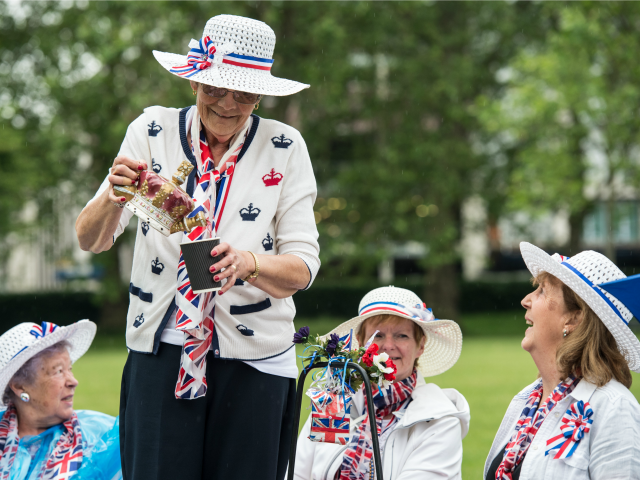A row has broken out among Women’s Institute (WI) members over “jingoistic” performances of “Rule Britannia” and “Land of Hope and Glory”. A second generation immigrant condemned the WI event, where British Union flags were flown, as “like being at a UKIP rally”.
In honour of the Queen’s 90th birthday, WI organisers modelled the close of 2016’s annual meeting on the Last Night of the Proms. But Cambridge-educated doctor, Jag Picknett, took to social media in protest at the event.
Describing herself as a “confident, educated, second-generation immigrant” to the UK, Dr. Picknett blasted British music and cultural symbols as offensive.
At the end of the meeting rousing British songs were played, like “Land of Hope and Glory” and “Rule Britannia”. Around 4,500 women, some in full Union Jack outfits, stood and waved flags as the band played.
“I sat down all the way through it – I should have walked out. I haven’t felt this uncomfortable since the 1980s. If you want diversity and inclusivity the National Federation of Women’s Institutes needs to take a long hard look at itself,” Dr. Picknett complained. “The finale was like being at a UKIP rally.”
It would seem, to Dr. Picknett, that “diversity” of cultures does not extend to British culture, as British culture is somehow offensive.
“Jerusalem, fine, sing Happy Birthday to the Queen, fine, National Anthem, fine. Wave flags and sing along to Rule Britannia and Land of Hope and Glory with a member on stage dressed as Britannia leading it… not okay.”
WI members told the West Yorkshire GP that the celebration was a “British Institution” and to leave if she feels so out of place. The Daily Mail reported that, on social media, Hilary Forbes said: “It’s just a bit of British tradition and fun.
“Nobody takes the words too seriously so if I was you I’d enter into the British way of being British.”
Brenda Perkins suggested Dr. Picknett “perhaps set up” her own group, with her own values and her own constitution. She told the GP “don’t try to change the WI to suit you.”
Chloe Mancey accused the doctor of being “over-sensitive”, elaborating that “Edward Elgar was a wonderful and much celebrated British composer and ‘Pomp and Circumstance’ is a song that is traditionally sung at many events. It is not racist or xenophobic.”
Chris Evans said: “We don’t rule the waves anymore but I’m sure you don’t want to be a slave any more than I do.” She added “This is our traditions, this is being British so wave the flags and sing the hymns loud and clear.”
Not everyone was in favour of the patriotism of the WI event, however. Teresa Murray wrote: ‘Racism, jingoism, elitism, colonialism. I’m a new member and am shocked by some of the attitudes. I was under the impression the WI was supposed to be about inspiring women. It’s certainly inspired me not to renew my membership.’
Natice Duncan responded: “I am truly shocked to see so many pompous, racist comments.” She said the WI should be “embracing the world as it is today, not 50 years ago. It is time to bring the WI into the modern world.”
It is reported the row may be seen in the context of a clash between old and new in the WI. The WI, like many other organisations, is seeking to “attract new and more diverse members, including working women from all walks of life and ethnicities.”
It increasingly seems, however, that when British institutions decide to “diversify”, they are forced to shed their British identities. A recent BBC documentary, which revealed that traditional Cockneys have almost gone extinct from London’s East End, drew criticism from “anti-racism” groups. A Women’s Institute representative was one of the signatories of a letter blasting the show for not celebrating the fact 147 languages are now spoken there nor praising its “vibrant, diverse” new make-up.
The letter also criticised the programme for implying there is such a thing as “native British”, despite the fact genes of modern day white Britons can be traced to these islands for thousands of years.
It is unclear how reflective of the WI’s wider membership the views of the “modernisers” are.
In 2015 the WI released a report reviewing the 100 years since the organisation’s founding in Britain. Asked who they consider the best contemporary role models for women today, WI members voted both HM Queen Elizabeth and the Duchess of Cambridge in the top three. Asked of top role models through history, respondents cited former Conservative Prime Minister Margaret Thatcher.

COMMENTS
Please let us know if you're having issues with commenting.